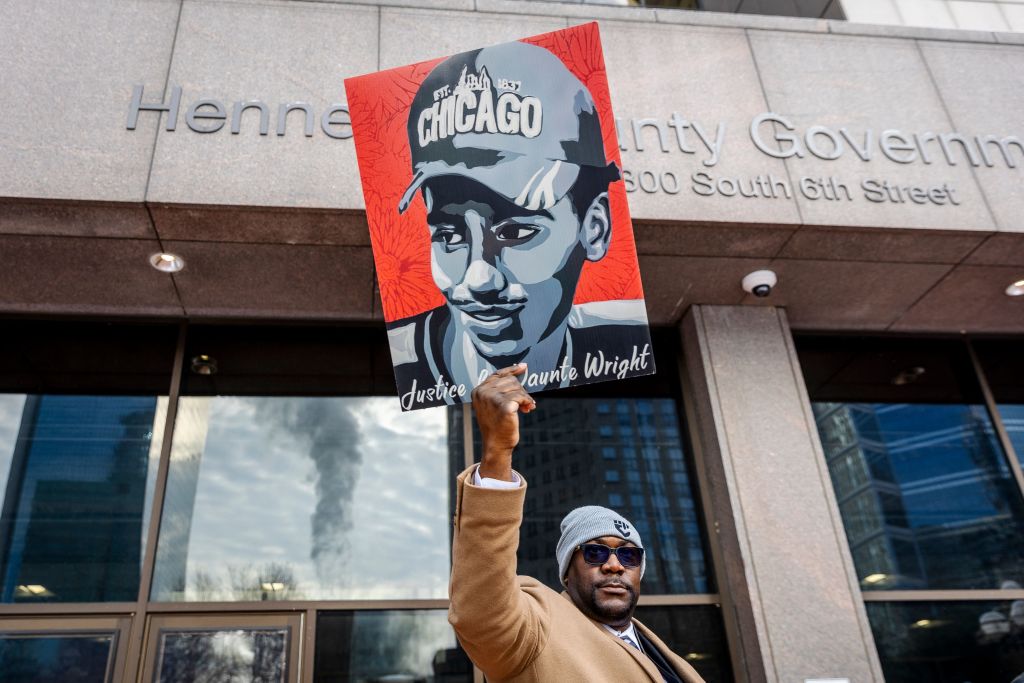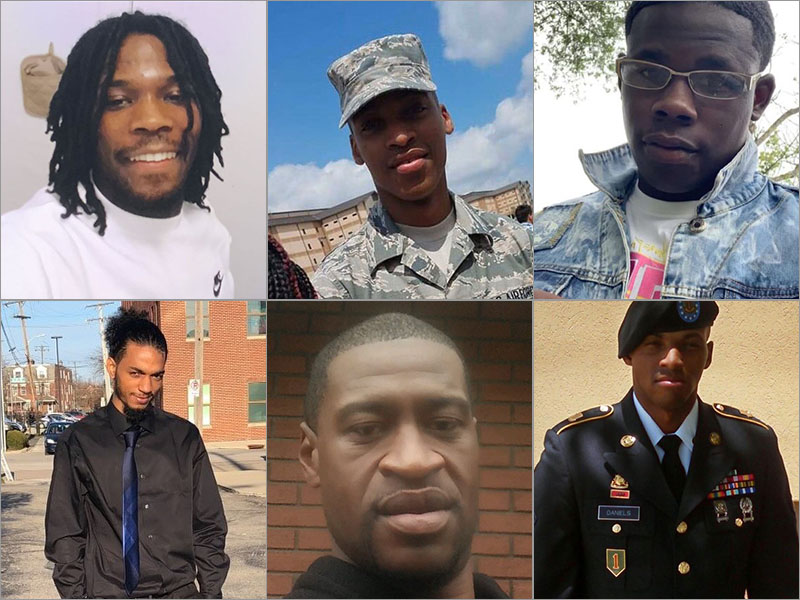Kim Potter Found Guilty Of Manslaughter In Daunte Wright Death
Justice For Daunte Wright: Kim Potter Found Guilty On All Counts

Philonise Floyd, George Floyd’s brother, holds a Daunte Wright image outside the Hennepin County Government Center as the trial of former Brooklyn Center police officer Kim Potter begins on December 8, 2021, in Minneapolis. | Source: KEREM YUCEL / Getty
A jury on Thursday returned a guilty verdict in the case of a former Minnesota police officer who killed a young Black man during a routine traffic stop after purportedly mistaking a gun for a Taser, ABC7 reports.
Kim Potter‘s conviction for killing Daunte Wright, 20, came after four days of jury deliberation. The 49-year-old former Brooklyn Center officer, who was found guilty of first-degree and second-degree manslaughter, faces up to 25 years in prison and as much as $50,000 in fines.
The legal team representing Wright’s family said after the verdict that Potter’s conviction is the type of accountability especially needed when it comes to law enforcement.
MORE: Kim Potter Appears To Cry While Testifying, But No Tears Actually Came Out Of Her Dry Eyes
“The family of Daunte Wright is relieved that the justice system has provided some measure of accountability for the senseless death of their son, brother, father and friend,” civil rights attorneys Benjamin Crump, Antonio Romanucci and Jeff Storms said in a brief statement emailed to NewsOne on Thursday afternoon. “From the unnecessary and overreaching tragic traffic stop to the shooting that took his life, that day will remain a traumatic one for this family and yet another example for America of why we desperately need change in policing, training and protocols.”
The attorneys added: “If we are ever going to restore the confidence of Black and marginalized Americans in law enforcement, we need to have accountability and a commitment to listening and to creating meaningful change. We must now turn our attention to ensuring that Kim Potter receives the strongest and most just sentence possible. It is also imperative that we focus on the conduct of Brooklyn Center and pinpoint its systemic failures that contributed to Daunte’s unlawful death.”
Amid the news, NAACP President Derrick Johnson offered a sobering truth: “this verdict does not correct the wrongful killing of Daunte Wright.”
After hearing the defense blame Wright’s death on himself, the jury — which was disproportionately composed of white people in a case that at times centered on the topic of race — began deliberating on Monday after about a week and a half of arguments and testimony in Hennepin County District Court in Minneapolis.
Hennepin County Judge Regina Chu on Monday shot down the defense’s last-ditch effort to have a mistrial declared on the alleged grounds that the prosecution did not adequately rebut closing arguments.
On Tuesday, during the second day of deliberations, the jury paused to ask Chu what would happen if they could not reach a verdict, suggesting the possibility of a mistrial. Chu responded by advising the jury to “discuss the case with one another and deliberate with a view toward reaching agreement if you can do so without violating your individual judgment.”
However, the jury did not indicate it was having difficulty reaching a verdict.
The defense rested its case on Friday following emotionally charged testimony by Potter, a 49-year-old former police officer in nearby Brooklyn Center, who at times appeared to be crying on the stand despite the glaring absence of actual tears neither welling up in nor falling from her eyes.
Potter’s testimony was broken up into two parts after her lawyer requested a brief recess as she appeared to become overcome with emotion. Critics could be forgiven for suspecting that her lawyers used the recess to further coach Potter’s language — which had been icy and steely until they showed video footage of her shooting — to appear more remorseful. This could explain why after only referring to Wright as “the driver,” Potter, following the recess, sobbed on the stand, “I’m sorry it happened.” This was the first time she had openly offered a semblance of an apology.
Earlier in the trial, Wright’s mother described the moment when she arrived on the scene where Daunte was killed during gripping testimony.
Minnesota Attorney General Keith Ellison — who secured a guilty verdict for the former police officer who murdered George Floyd last year — announced in May that his office would be leading the prosecution in Wright’s killing. Calls for Potter’s charges to be elevated to murder have not been heeded.
Wright was shot and killed on April 11. His death came during the murder trial for Derek Chauvin, the former Minneapolis police officer found guilty and convicted for killing George Floyd last year.
Critics found the circumstances surrounding Wright’s death suspicious from the beginning, including and especially Potter’s purported confusion of her gun and Taser, something that experts on both sides of the case testified about.
But Wright was also pulled over in what is often described as a pretextual traffic stop — when cops use minor violations to pull over disproportionately Black and brown motorists as a means to investigate them for other possible offenses. Wright was allegedly guilty of having too many items hanging from his rearview mirror.
As Minnesota Public Radio reminded its readers days after Wright’s killing, “Minnesota is one of a number of states with laws that prohibit drivers from hanging objects from their rearview mirrors on the grounds that the items could obstruct their view. The laws have led to vehement complaints from civil rights advocates who say police can use them as a pretext for stopping Black motorists.”
Officially, he was driving a car with expired registration tags. However, Wright was also pulled over at a time during the pandemic when special courtesies were being made for drivers because of residual delays to renew registration.
That boils down to Wright simply being pulled over for “driving while Black,” civil rights attorney Ben Crump has repeatedly said about the case.
But Potter’s decision to use a weapon in a case that did not involve any violence and certainly no threat against any officers also invited questions about her judgment and possible implicit biases that compelled her to resort to using any force in a situation that arguably did not require any.
The jury’s verdict means that the panel agreed/disagreed that Potter was guilty of “reckless handling or use of a firearm so as to endanger the safety of another with such force and violence that death or great bodily harm to any person was reasonably foreseeable,” as the official charges read. The second-degree manslaughter charge accused Potter of having “caused an unreasonable risk and consciously took a chance of causing death or great bodily harm” to Wright with a deadly weapon.
First-degree manslaughter is a felony that is punishable by up to 15 years in prison and a fine as high as $30,000. Second-degree manslaughter is also a felony with a possible prison sentence of up to 10 years and a maximum fine of $20,000.
This is a developing story that will be updated as additional information becomes available.
SEE ALSO:
Here We Go Again: Mostly White Jury Selected For Trial Over Daunte Wright Killing
Daunte Wright Is Laid To Rest After Moving Funeral In Minneapolis
















